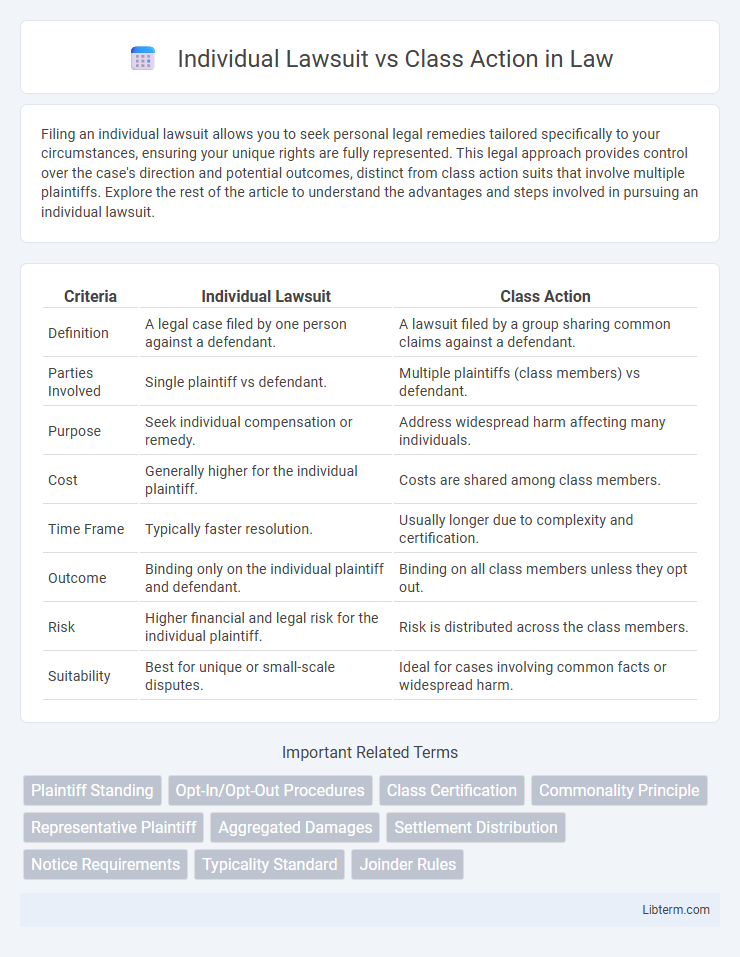Filing an individual lawsuit allows you to seek personal legal remedies tailored specifically to your circumstances, ensuring your unique rights are fully represented. This legal approach provides control over the case's direction and potential outcomes, distinct from class action suits that involve multiple plaintiffs. Explore the rest of the article to understand the advantages and steps involved in pursuing an individual lawsuit.
Table of Comparison
| Criteria | Individual Lawsuit | Class Action |
|---|---|---|
| Definition | A legal case filed by one person against a defendant. | A lawsuit filed by a group sharing common claims against a defendant. |
| Parties Involved | Single plaintiff vs defendant. | Multiple plaintiffs (class members) vs defendant. |
| Purpose | Seek individual compensation or remedy. | Address widespread harm affecting many individuals. |
| Cost | Generally higher for the individual plaintiff. | Costs are shared among class members. |
| Time Frame | Typically faster resolution. | Usually longer due to complexity and certification. |
| Outcome | Binding only on the individual plaintiff and defendant. | Binding on all class members unless they opt out. |
| Risk | Higher financial and legal risk for the individual plaintiff. | Risk is distributed across the class members. |
| Suitability | Best for unique or small-scale disputes. | Ideal for cases involving common facts or widespread harm. |
Understanding Individual Lawsuits vs Class Actions
Individual lawsuits involve a single plaintiff seeking compensation or resolution against a defendant, allowing for personalized claims tailored to specific damages or circumstances. Class actions aggregate multiple plaintiffs with similar claims into one lawsuit, enhancing efficiency and power against large entities while potentially limiting individual control over outcomes. Understanding the procedural differences, potential recoveries, and strategic uses of each type is critical for plaintiffs considering legal action.
Key Differences Between Individual and Class Action Lawsuits
Individual lawsuits involve a single plaintiff pursuing a legal claim against a defendant, allowing for personalized control over the case and potentially quicker resolution. Class action lawsuits consolidate multiple plaintiffs with similar claims into one lawsuit, offering efficiency in handling widespread harm but requiring court approval to represent the group. Key differences include the scale of plaintiffs, control over legal decisions, and potential monetary recovery distribution among class members.
When to Consider Filing an Individual Lawsuit
Filing an individual lawsuit is advisable when the damages are substantial enough to justify the cost and effort of legal action, or when the legal issue uniquely impacts your personal situation. Pursuing an individual case allows for tailored remedies and potentially faster resolution compared to class actions. This approach is beneficial when the plaintiff seeks specific relief not available in a class settlement or prefers direct control over the litigation process.
Benefits of Pursuing a Class Action Lawsuit
Class action lawsuits offer plaintiffs the advantage of shared legal costs, making it financially feasible for individuals with smaller claims to seek justice collectively. This process increases efficiency by consolidating many similar cases, reducing court congestion and expediting resolutions. Class actions also amplify plaintiffs' bargaining power, leading to larger settlements and stronger deterrent effects against corporate misconduct.
Potential Drawbacks of Individual Lawsuits
Individual lawsuits often face potential drawbacks such as higher legal costs per plaintiff, longer timeframes for resolution, and limited leverage against large corporations. Plaintiffs may encounter increased financial risk due to upfront expenses and lack of economies of scale that class actions provide. The absence of collective bargaining power can result in lower settlements or judgments compared to pooled claims in class action lawsuits.
Common Types of Class Action Cases
Common types of class action cases include consumer protection, securities fraud, employment discrimination, and product liability claims, where numerous plaintiffs share similar legal grievances against a single defendant. Individual lawsuits focus on specific personal damages, while class actions consolidate multiple related claims to improve efficiency and resource allocation. This collective approach allows for more effective remedies in situations involving widespread harm or systemic issues.
Legal Processes: Individual Lawsuit vs Class Action
Individual lawsuits involve a single plaintiff pursuing a claim against a defendant, requiring the plaintiff to prove their case independently through evidence and testimony. Class actions consolidate claims from multiple plaintiffs with similar legal issues into one lawsuit, streamlining court resources and providing a collective remedy. Legal processes in class actions include class certification, where courts assess whether the group meets criteria such as numerosity and commonality, which is not applicable in individual lawsuits.
Compensation and Settlements: What to Expect
Individual lawsuits typically offer compensation based solely on the claimant's specific damages, resulting in potentially higher payouts tailored to the unique circumstances of the case. Class action settlements distribute a collective fund among all eligible plaintiffs, often leading to smaller individual awards but providing access to compensation for those who might not afford a solo lawsuit. Settlement amounts in class actions depend on the total damages and number of claimants, while individual suits may involve protracted negotiations or trials aiming for maximum personal recovery.
Choosing the Right Legal Option for Your Case
Choosing between an individual lawsuit and a class action depends on the specifics of your case, such as the number of affected parties and the complexity of the legal issues. Individual lawsuits offer personalized control and potentially higher compensation but may involve greater expense and time. Class actions consolidate similar claims, reducing legal costs and increasing leverage against defendants, ideal for widespread harm affecting many plaintiffs.
Frequently Asked Questions About Lawsuit Types
An individual lawsuit involves a single plaintiff pursuing a legal claim against a defendant, while a class action consolidates multiple plaintiffs with similar claims into one case. Frequently asked questions often address differences in cost, duration, and potential compensation, with class actions typically lowering individual expenses but extending timelines. Understanding these distinctions helps plaintiffs choose the most effective legal strategy for their specific circumstances.
Individual Lawsuit Infographic

 libterm.com
libterm.com